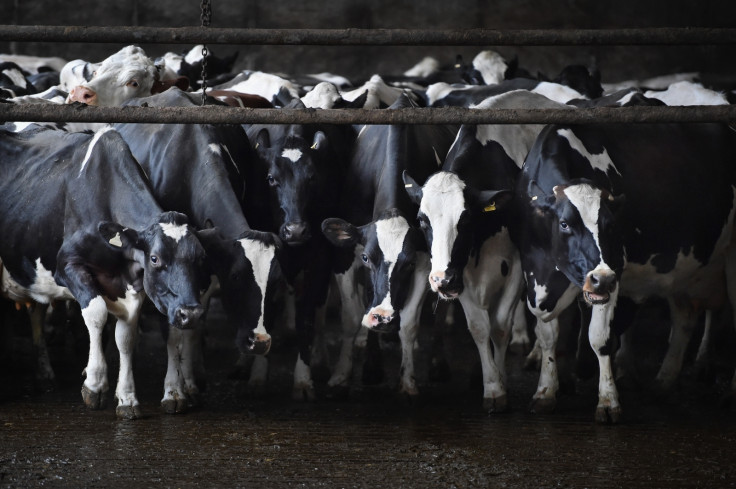There's no such thing as humane cows' milk – these animals are treated like machines
Even an 'organic' label is no guarantee that cows are treated well.

The dairy industry committed a spectacular own goal when it complained to the Advertising Standards Authority about an advertisement describing what happens to cows bred and killed for milk.
The ad, produced by campaigning group Go Vegan World, describes mother cows searching and calling frantically for their babies. It describes the separated female calves trembling and crying, drinking milk from rubber teats instead of their mothers' udder, "because humans take their milk".
Of course the ASA rejected claims that it was misleading, because that is exactly what happens to cows and their calves every day on dairy farms up and down this country.
Sensitive, intelligent animals are treated as nothing more than milk-producing machines.
Life for a cow in the dairy industry is a repetitive cycle of artificial insemination, carrying her baby in her womb for nine months, giving birth and then, hours later, enduring the heartbreak of having her baby stolen away from her.
The separation is deeply traumatic for both mother and calf, but business is business, and the grieving mum is hooked up to a milking machine so that the milk that nature intended for her calf can be extracted from her body and sold for human consumption. Her baby, wide-eyed, terrified and desperate to suckle is instead given a bottle of milk "replacer".
If the calf is male, it might be followed by a bullet to the head or a short life in a veal pen. If female, she'll enter the same cycle of misery as her mother: forcible insemination, pregnancy, birth, her baby taken away.
This will go on for about five years until her abused body is no longer deemed commercially viable and she's sent to be slaughtered, 15 years earlier than the average life expectancy of a cow.
All cows are individuals with distinct personalities. Some are bold and adventurous; others are shy and timid. Some are friendly and considerate; others are bossy and tenacious. Animal behaviourists have found that cows interact in socially complex ways.
On intensive British dairy farms, they may spend their entire lives inside sheds, forced to stand on concrete flooring. Even an "organic" label is no guarantee that they will be treated well. Cows are still forcibly impregnated and endure the same heartbreak when their calves are taken from them year after year.

They often aren't given antibiotics even when their udders become infected (which happens frequently), because medicated animals lose their "organic" status. And then they're still slaughtered when they outlive their usefulness to the farmer.
Mother cows produce milk for the same reason that human mothers do: to feed their babies. Humans are the only species to drink another animal's milk. Think about it – it would be no more natural for us to drink milk from a cow than it would be for us to drink milk from a dog, a rat, or any other animal.
Most of us were weaned from our mother's milk (the only milk we've ever needed) before our first birthday. Only years of conditioning could make a grown man or woman not see the absurdity of drinking milk as an adult.
But the veil is being lifted and many people are starting to see things for what they are. As a consequence, sales of cows' milk are beginning to sour and demand for non-dairy options are growing – with one in five households now choosing plant-based milks.
You don't need to walk far down a supermarket aisle to see the results of the increasing demand for dairy-free choices, including many varieties of plant-based milk, yogurt, cheese, and ice cream. It's not surprising that consumers are ditching dairy foods: they're full of cholesterol and artery-clogging saturated fat, and drinking cows' milk has been linked to an increased risk of prostate and breast cancers.
Animal-based agriculture is also unsustainable. It takes an estimated 1,000 litres of water to produce 1 litre of cows' milk but just 50 litres of water to produce one litre of soya milk. And don't forget to factor in the wastefulness of feeding soya beans and other crops to cows rather than directly to humans. In addition, animal agriculture contributes significantly to all human-caused greenhouse-gas emissions.
The ASA's positive ruling on the "Humane milk is a myth" message is a step forward for animal rights. If the thought of animal suffering bothers you, as it does me, just remember that you don't have to support an industry that tears calves away from their mothers for milk.
There are coconut, almond, oat, soya, and plenty of other dairy-free milks, yogurts, and cheeses to choose from – all of which truly are humane, as well as being kinder to the planet and better for your health. PETA offers a free vegan starter kit at PETA.org.uk for anyone who wants to be weaned.
© Copyright IBTimes 2025. All rights reserved.




















